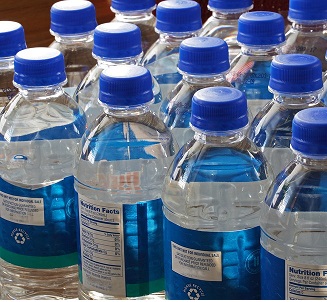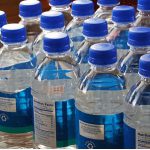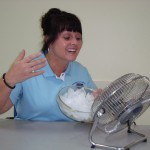
Water: Myth or Fact?
Summer has arrived! During the summer months, especially along the Gulf Coast, it is hot and humid. Keeping the body hydrated is important to maintaining good health.
As the temperature rises in the summer and the body loses more water through evaporation and perspiration, it makes good sense to increase your intake of fluids. Keep in mind that by the time you notice you are thirsty, you have already depleted your water stores dramatically. A good rule of thumb is to drink a few ounces of water every fifteen to thirty minutes when you are working or playing hard in the heat.
- Myth or Fact – You should drink at least eight glasses of water a day.
Myth – On average, the body requires a half gallon of water daily. That’s the amount required to replace what has been lost through perspiration, evaporation, and body waste. Milk, juice, and other fluids can be added to your daily total. Beverages that contain caffeine, such as coffee, tea, and soft drinks, are not good substitutes for water. Caffeine actually may cause the body to lose water. The same is true for alcoholic beverages. They contribute to water loss, not gain, because alcohol acts as a diuretic.
- Myth or Fact – All water is the same.
Myth – The following guide will help you navigate the sea of choices available:
- Distilled Water – is pure water with no added chemicals or minerals.
- Mineral Water – is available in canned or bottled varieties. Many brands include a mix of minerals to improve the taste. Natural or artificial flavors, such as lime or lemon, may be added to some. Some varieties add sugar. Check the label.
- Soft Water– commercially softened water often is treated with salt and tends to be high in sodium.
- Sparkling Water– some sparkling waters contain bubbles naturally; others are created with the addition of carbon dioxide.
- Well Water – is more commonly known as tap water.
- Myth or Fact – Increasing daily water and fluid intake is difficult.
Myth – Actually, there are a variety of ways to increase water and other fluid intake. Purchase a insulated water bottle and refill it throughout the day. Add flavor to water. Infused water is becoming a popular food trend. Infuse with strawberries, lemons, limes, or other flavorful fruits and vegetables. Choose foods that contain high levels of water content – for example, watermelon, grapes, and kiwi. Start the day with a glass of water at breakfast.
- Myth or Fact – Water aids in bodily functions.
Fact – Water contributes about sixty percent of an adult’s body weight. Staying hydrated may be a major benefit to increasing energy production. Increased water consumption can aid in weight loss. Water aids in the body’s temperature regulation, acts as a lubricant, and cushions around joints. Water serves as a solvent for minerals, vitamins, amino acids, and glucose. Because water is vital to bodily functions, the body directs many of its activities toward maintaining balance.
- Myth or Fact – You can drink too much water.
Fact – Over-hydration can result in water intoxication. Water intoxication occurs when you consume more water than the kidneys can excrete. Consuming large amounts of water in a short period of time can result in intoxication. Remember, you should drink at least eight glasses of water a day – it’s a fact.
Reference: https://authoritynutrition.com/7-health-benefits-of-water/


